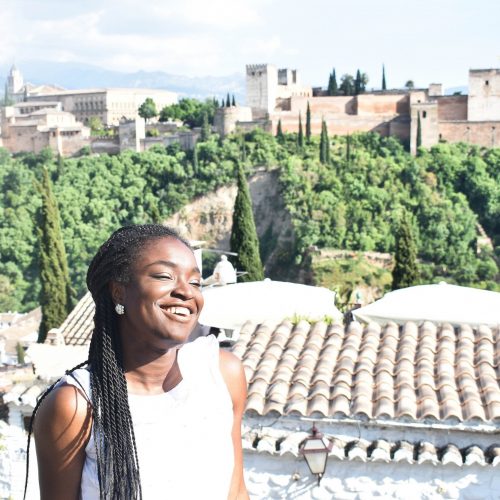
Living and Traveling in Spain as a Black Person: An Interview with Somto
Dear Diana,
The rights of all people, all humans, are something that we believe are universal. However, recent events have made us here at Sincerely, Spain dive deep into our cultural pasts and think about how we are part of the problem. We have been working to try and better understand our white privilege and go beyond what is comfortable to understand how our everyday actions can negatively impact people in our communities. And we think it is important that our readers are also aware that being Black (and many other minorities as well) can impact you while living abroad and traveling in Spain.
While Dani and Claudia have witnessed racism that our friends have suffered because of the color of their skin, and we have talked about these subjects in “safe spaces,” we now want to bring the conversation to the world. However, we are not subject matter experts and that is why today we are making space for Somto, a beautiful Black blogger who has become somewhat of an expert on Spain, among other things. We highly recommend you check out her webpage, Somto Seeks, as she offers invaluable advice to her followers in the world of travel and entrepreneurship.
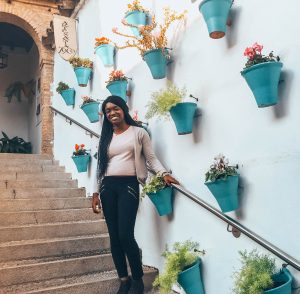 Interview with Somto:
Interview with Somto:
Before we get into the nitty gritty, tell us a bit about yourself and how you ended up being such a passionate, vibrant blogger in the travel and entrepreneurial space.
I spent my childhood in Nigeria, where people are intensely curious about the outside world. As a child, I remember watching Chinese, American, and Middle Eastern movies regularly. The Home Alone movies were a favorite. It was also quite normal to listen to foreign music – from South Africa, The Congo, India, America, and many other countries. Those experiences made me naturally open to other cultures and ways of life.
By a sheer stroke of luck, my mom won the American visa lottery when I was nine. In a matter of months, my family packed our entire lives into a few suitcase and moved to Los Angeles, California. America, in my mind, was this magical, otherworldly place so I was beyond excited. But upon arrival, I experienced a major culture shock. It was not at all like the movies. With time, I eventually started to assimilate into the new culture. At school, I became friends with people from all backgrounds – Korean-Americans, Indian-Americans, Mexican-Americans, Filipino-Americans, among others. This further broadened my worldview and made me even more interested in experiencing other cultures. I also participated in Model United Nations, which cemented my interest in world affairs and travel. By the end of high school, I was itching to travel the world.
College provided me the opportunity to do that. I participated in several international immersion trips, interned in China for a summer, and studied abroad in Spain. That’s when I developed a deep love for travel. I remember the precise moment that I first experienced the euphoria of travel. I was at the Great Wall of China, looking over the horizon as the walled snaked around the vast landscape for miles. I had this moment of intense clarity, joy, and gratitude. It was as if the world stood still – an awakening of sorts. I will never forget that moment. It was when I committed to making travel a part of my life.
Still, I never considered travel as a career option. Coming from a Nigerian immigrant family, I was expected to choose one of four career options – medicine, law, engineering, or academia. I reluctantly chose the pre-med route, but struggled with chemistry classes. So I made the bold decision to follow my passion and switched my major to international relations. After graduating from college, I worked at a few organizations in Silicon Valley and Washington DC. That’s when I started to reconsider my career plans. I realized that I didn’t want a traditional 9 to 5 job. I was losing my hair, suffering from fatigue, and just deeply unhappy. I had to move in a new direction.
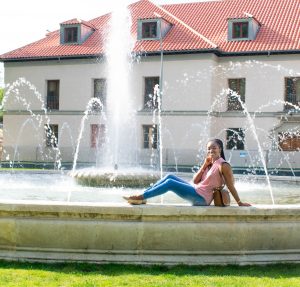 Looking for adventure and a change of pace, I moved to Madrid to teach English. I had visited Madrid when studying abroad in Spain and knew I had to return someday. In my early 20s, I didn’t have many financial responsibilities or other commitments so it was the perfect time to move abroad.
Looking for adventure and a change of pace, I moved to Madrid to teach English. I had visited Madrid when studying abroad in Spain and knew I had to return someday. In my early 20s, I didn’t have many financial responsibilities or other commitments so it was the perfect time to move abroad.
With Madrid as my home base, I traveled around Europe for almost a year. One weekend I was sipping wine in Porto and the next I was frolicking on the black sand beaches of Santorini. I fell in love with life again. It was also in Madrid that I discovered the blogs of two black female travelers – Oneika Raymond and Gloria Atanmo. They opened my eyes to the world of travel blogging, and I was intrigued! I didn’t even know that was an option.
About nine months after returning from Spain, I created my own travel blog, Somto Seeks, and started to gradually work on it. As an introvert, I hesitated for some time about putting myself out there. But I had a burning desire to share my travel experiences with the world and help other adventurous black women travel solo. This helped me overcome the resistance and press forward. Finally, I launched my blog in September 2017, receiving tons of positive feedback. It encouraged me to keep going.
In the process of turning my blog into a business empire, I invested over $50,000 in courses, coaches, conferences, and books to uplevel my mindset, identity, and business acumen. I wanted to learn from the best of the best to make my entrepreneurial dreams a reality so I sought out experienced mentors. I dove deep into topics like search engine optimization, Pinterest marketing, affiliate marketing, email marketing, brand collaborations, and online course creation. As I explored these subjects, I became more and more interested in the business side of blogging. I wanted to show people that they can turn their love of travel into an online business and build a location-independent lifestyle. So in addition to writing about solo travel, I started including blogging and online business advice on my blog.
 And what was it especially that called you to Spain?
And what was it especially that called you to Spain?
I started studying Spanish in high school. It was then that I started to learn about Spain and the broader Spanish-speaking world. I loved learning Spanish. It’s such a beautiful, romantic language. Naturally, I wanted to spend time in a Spanish speaking country. Spain was the natural choice for me because I was intrigued by the culture and lifestyle from what I had read in books and seen in movies. So in college I studied abroad in Bilbao, Spain. I had the most amazing time of my life! The Basque country was so lovely and inviting. I enjoyed visiting cities like San Sebastián and Guernica.
The highlight of my experience, though, was my visit to Granada. That’s when I fell deeply in love with Spain. I remember visiting La Alhambra one breezy night, looking over the city and feeling so elated. It was similar to the experience I had at the Great Wall. Then I went to a flamenco show in a cave in Sacromonte and was blown away. The intensity and passion of the dancers was infectious! I still vividly remember that experience even though it was almost ten years ago.
What did you love most about living abroad in Spain? What was most difficult?
I just loved the slow, leisurely lifestyle and the emphasis on enjoyment. In America, it was always work work work. I was on the go all the time, stressed and depressed. By the time I moved to Spain, I was burned out. Living in Spain helped me regain my zest for life. At the school where I worked, all the teachers would go out to a bar to have a drink and eat tapas during lunch. I love that people don’t take life too seriously in Spain.
On the flip side, the laid back attitude in Spain does have its drawbacks. For instance, dealing with the Spanish government was difficult, when it came handling matters related to my visa. The officials never seemed to be on the same page. There were lots of run-arounds and inconsistent information. It was a headache trying to sort out the paperwork. Many fellow English teachers experienced similar problems. There were also issues with the administration at the school where I worked. It came down to a lack of organization and efficiency, but I didn’t let that affect me. I knew that I was in a different country so I had to be open to new ways of doing things.
 Unfortunately, we know racism is real and we have had conversations with our non-European-appearing friends about how they are treated differently because they have different physical features than the typical Spaniard. What has been your experience with this?
Unfortunately, we know racism is real and we have had conversations with our non-European-appearing friends about how they are treated differently because they have different physical features than the typical Spaniard. What has been your experience with this?
I’ve written in-depth about my experience with racism in Spain because I want other black travelers to know about the realities of being black in Spain. Unfortunately, there are some deep-seated prejudices against black people in Spain that date for centuries. I was treated differently in various settings, from my workplace to public places like parks, restaurants, and tourist attractions. The worst incident was when I was denied service at a tapas bar in Valencia. Here I was in a country whose culture and history I deeply admired. I was in Valencia to experience the Las Fallas festival. To not be welcome there was sort of a slap in the face. But I chose not to take it too personally. I know that there are racist people everywhere. That doesn’t excuse the behavior of the racist people I encountered in Spain. It’s that racism is a reality that black people face around the world, whether they’re traveling or not.
Still, I want to be clear that my experiences in Spain were overwhelmingly positive. The incidents of racism, while hurtful, came from a minority of people, typically older individuals. I made a lot of friends with younger Spaniards and continue to keep in touch with them. My landlady, who was in her 60s, is one of the kindest people I’ve ever met. At the same time, I can’t ignore the experiences of other black people, like soccer players who have had bananas thrown at them, black women who have been mistaken for prostitutes, and black tourists who have had tomatoes pelted at them. Those types of incidents highlight the underlying hatred and disregard towards black people that exists in certain sects of Spanish society. I think it’s my duty as a black travel blogger to highlight these stories because travel isn’t all sunshine and rainbows. I have to speak my truth even if it upsets people.
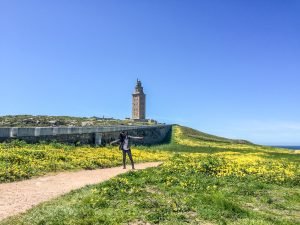 On your blog, you have a post where you talk about the friendliest countries in Europe for Black travelers. We notice that Spain is not on that list. What makes a country a “Black friendly country”?
On your blog, you have a post where you talk about the friendliest countries in Europe for Black travelers. We notice that Spain is not on that list. What makes a country a “Black friendly country”?
That’s a great question. I think what makes a black-friendly country is entirely subjective. In compiling that list of the friendliest countries for black travelers, I investigated the experiences of other black travelers and drew upon my own experiences. Some of the criteria for determining whether a country is black friendly include: the perceived level of tolerance and open-mindedness towards black people and black cultures, the frequency of race-motivated mistreatment or discrimination, and cultural sensitivity.
For instance, the practice of black face continues to be a tradition in Spain and the Netherlands. That would constitute a lack of sensitivity towards matters of race. If black travelers on forums continuously talk about being mistreated in a certain country, then there has to be some truth to it. There’s no exact science to determine the “black-friendliness” of a country. It’s really a matter of perception and experience.
I also think it’s important to make a distinction between black-American travelers, black Europeans, and Africans. Passport privilege is real, not only in terms of what countries you can visit, but also in terms of how you’re treated. I find that black travelers holding American or British passports tend to be perceived as more sophisticated and “tolerable” than those from Africa. Hence, they are treated better. I’ve experienced this many times during my travels in Spain. When I said I was from America, people were much friendlier and open to me than when I said I was Nigerian. Being an American shields you from the worst kinds of discrimination and prejudice. I acknowledge that privilege and think it’s important to talk about it. Black people and black travelers aren’t a monolith.
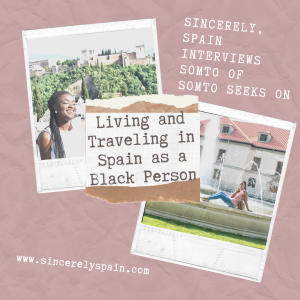 Thank you so much Somto for taking the time to answer our questions today and giving us insight into what it means to be Black while living in and traveling around Spain.
Thank you so much Somto for taking the time to answer our questions today and giving us insight into what it means to be Black while living in and traveling around Spain.
We are constantly looking to go beyond what we know and grow around important topics like this one. What questions do you have about this? What else do you want to know?
Sincerely,
Spain
P.S. If you’re looking for further resources on racism in our world, Dani and Claudia have really enjoyed, among other resources, Rachel Cargle’s #DoTheWork and Layla F Saad’s Me and White Supremacy, which have made us frustrated, angry, and upset. Additionally, we like Uncomfortable Conversations with a Black Man with Emmanuel Acho that makes our jaws drop and tears come to our eyes. We are also trying to incorporate more books that both talk about anti-racism and books by people of color. If you have any recommendations, please share them in the comments below.


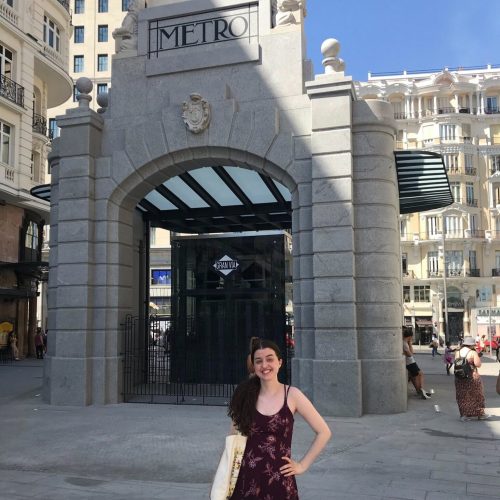
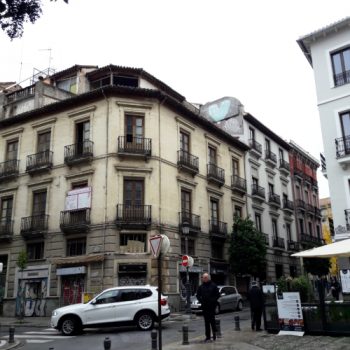
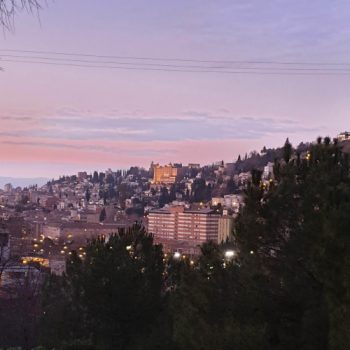
2 Comments
ruflessmo@yahoo.co.uk
Brilliant blog. Thank you for your insight into racism in Spain. Anyone that isn’t white experience vile behavior. I commend Somto for speaking up in an articulate manner. I am also a minority and it still opens my eyes. I fall into this fake pseudo reality. Thinking that life is all roses and what we see on TV is a dream we want to live. That comes crashing down when we are reminded about our skin colour and how we are scums and unworthy. Those closed minded individuals need re-educating.
Sincerely, Spain
Dear Rufless,
Thank you for your comment and we are glad you could resonate with Somto’s post. We highly recommend checking out her blog for more on her insights into the world.
Sincerely,
Dani and Claudia